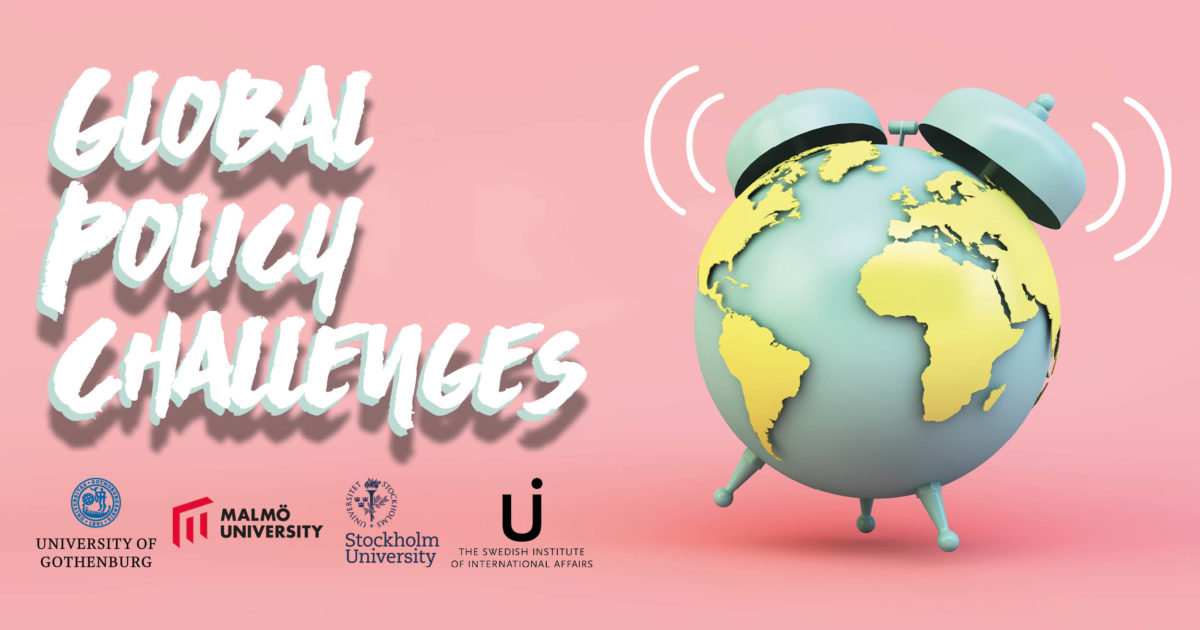
Joint Graduate School in Global Policy Challenges
Swedish society is beset with complicated policy challenges, most of which originate beyond our borders and require common solutions. The challenges are growing increasingly complex. From climate change to disinformation campaigns and from the regulation of artificial intelligence to pandemics, uncertainty and confusion surrounds not only the problem but also potential solutions – as COVID has made blindingly clear.
The Problem
Now more than ever, Sweden must reassess the stove-piped status of academia, industry, and government in this country. There is far too little cross-fertilization of scholarly research, industrial expertise, policy-relevant analysis, and governmental authority –which undermines Sweden’s capacity for solving societal problems. The goal must be to enhance both research and practice: bringing a solid knowledge base to underpin policy choices, while ensuring policy dilemmas receive attention from scholars.
The Plan
This Global Policy Challenges initiative draws the worlds of policymakers (in government), analysts (in think-tanks), practitioners (in industry), and academics (in universities) together at the highest level of academic training: the PhD level. It hopes to open these relatively closed systems, to concentrate intellectual resources that are currently scattered – all in the interest of finding solutions to society’s most pressing problems.
The initiative – currently framed as a ‘forskarutbildningssamarbete’ – is comprised of several elements:
- A more open track for those wishing to pursue PhD studies. PhD studies are relatively closed in Sweden, especially in the social sciences. Candidates are asked to take up full-time jobs as doktorander in universities, take term-long courses, and spend their time writing up to a 5-year period. Mixing old and new employments is largely impossible: one must divorce themselves from practice and join ‘the academy’. Our initiative aims to open new positions, funded jointly by universities, industry, and foundations, that allow for part-time studies and connections with former employments. No longer must one choose; no longer is expertise and knowledge held back by professional borders. Quality standards would remain high, and vetting processes rigorous, to uphold the integrity of the PhD selection process. PhD projects could be focused on critical global problems, such as artificial intelligence, climate change, or weapons of mass destruction, to ensure concrete outputs to help Swedish society.
- More customized courses aimed at pressing global policy challenges. Our PhD education contains the traditional research training but will include timelier and policy relevant courses. Courses on such topics as International Trade and Human Rights; Disinformation and Democracy; Climate Risks and Opportunities; Diplomacy and International Security; Migration, Extremism, and Integration; and Political Risk Analysis. These are just examples. Working with funders, we can develop new kinds of courses, often involving collaborative teaching (experts, diplomats, academics). Courses will be open to non-PhD-track participants, too, such as employees and public officials, who can earn a diploma for individual courses. Courses can be designed in practical, compressed form, such as 1-week or multiple weekends, to bring courses closer to participants’ homes.
- Build new relationships through networking. The worlds of think-tank workshops, academic seminars, practitioner study groups, and industry task forces can be drawn together through this program. New cohorts of PhD students, each year, will attend seminars and workshops designed for them. They will also be invited to the combined events sponsored regularly by the project partners. These relationships will allow for the sharing of knowledge and experience, as some of the toughest societal problems are tackled through new research collaborations.
Each element here is concrete and tangible, pulling together the diverse sources of knowledge and experience required to solve pressing problems. The overarching goal is to make PhD education more accessible, more timely, and more problem-focused.
The Team
The Global Challenges Initiative is driven by three Swedish universities in Malmö, Gothenburg, and Stockholm, together with the Swedish Institute of International Affairs. Together those institutions comprise hundreds of docents and professors with topical expertise. The project leaders, below, are docents and professors with long experience with policy-related work and PhD education.
The Department of Global Political Studies, Malmö University: Astrid Hedin, docent
The Department of Economic History and IR, Stockholm University: Mark Rhinard, prof.
School of Global Studies, University of Gothenburg: Isabell Schierenbeck, prof.
Swedish Institute of International Affairs (Utrikespolitiska institutet): Christer Ahlström, director
The Pitch
We invite organizations to join the initiative as partners and funders. Funding opportunities, in whole or part, include:
- Naming rights for the entire initiative.
- Sponsorship of PhD positions, focused on specific research questions.
- Sponsorship of specialized courses, addressing topical risks and threats.
- Sponsorship of workshops, seminars on issues of relevance to the PhD cohort.
Partnerships and in-kind support, mainly drawn from industry partners and government, include:
- Providing teachers for course development and instruction.
- Providing supervisors for PhD courses.
Outputs
- Concrete studies on current global policy challenges (PhD theses, etc).
- Networking opportunities and relationship building (professional course cohorts).
- Timely PhD courses focused on link between theory, practice and policy.
- Career development opportunities for staff.
- Visibility for universities, businesses, and think-tanks.
